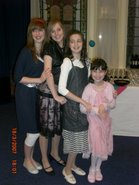Disclaimer
This blog represents my views and opinions. They are not necessarily those of any other member of my Chambers, none of whom contribute to the blog, or assist me with it.
Editorial
Now moved to http://pupillageandhowtogetit.wordpress.com/ for reasons of convenience and ease. Come and see.
Tuesday, 22 May 2007
Temporary Absence
In about an hour's time it is the start of the festival of Shavuot (Pentecost). As an orthodox Jew I will be off to synagogue, followed by staying up all night learning (yes really). The festival lasts for 2 days during which we don't have the TV on, answer the phone, drive a car, or use the computer. For those of you aghast at these deprivations and wondering how we survive the answer is that we pray, read, talk, sleep, learn and talk some more.
So, I won't be answering questions (including on TSR) or posting until late Thursday night/Friday morning. I'm not being rude and I haven't gone away for good - I know how you all worry :)
More anon.
So, I won't be answering questions (including on TSR) or posting until late Thursday night/Friday morning. I'm not being rude and I haven't gone away for good - I know how you all worry :)
More anon.
Subscribe to:
Post Comments (Atom)



6 comments:
Re. not using technology for Shavout, does the same apply for the Sabbath? I had a friend who never used the tram on a Friday evening home from work.
What is the rationale/reasoning behind this?
Thanks! :)
Hi Simon,
Thank you for letting everyone know. Hows was it? I hope it's not been too tiring. I remind me off ramadhan which is a little similar.
Regards,
Anisah
It was lots of fun thank you, although tiring. I think it is only a little like Ramadan because our problem is too much food not too little! It's a tradition to eat dairy foods and I have had so much cheese cake that I am starting to look like one - i.e. round. But in terms of religious priorities it is equivalent.
And, yes, the restrictions are very similar to those of Shabbat, although less strict as regards cooking for example - allowed on Shavuot and other holidays, not allowed on Shabbat. The travel restrictions can be a bugger because in winter Shabbat starts at about 330 pm. I have had to walk the 6 miles home from Court more than once...
Hi Simon,
That is interesting, I guess your lucky to an extent as at least your allowed to eat during the day. During Ramadhan we are not allowed to eat during the whole day from sun rise to sunset.
Anyway- oh, so did you still go to work/court?
I thought you would have time off, I bet you must be tired. Anyway- i guess it's a good experience and worth it.
Take care-
Regards,
Anisah
May I ask what the rationale/reasoning is behind the no technology restriction Simon?
Smartie.
The no technology restriction is actually a no work restriction. It applis to both Shabbat and festivals, albeit there are particular things allowed on festivals but not on Shabbat.
The reason is threefold. On the simplest level the commandment not to work on Shabbat is to be found in Exodus - 35:1-3. The commandment is next to the commandment to build the sanctuary in which God's Presence rested. When the sages ask 'what is work?' they deduce, from the proximity, that work is anything required to build the sanctuary. From that they extrapolate 39 specific prohibitions - each with subsidiary categories analogous to the main category. Thus, fire was required to build the sanctuary (specifically to make the alter). Fire is thus forbidden on Shabbat. Turning on a switch is analogous to making a fire and is also forbidden. So - no turning on lights, TVs, computers. A time switch can be used for lights if set before Shabbat. But the computer has no value and produces electrical current (fire) when operated so it's a no-no.
A second reason is that God ceased work on the 7th day - Genesis 2:1. So, we replicate that by ceasing our own creative work - i.e. making other things work for us. Work need not be difficult or arduous. The test is whether it creates. Switching on a light creates a spark and then the light.
The third reason is more spiritually based. On Shabbat we try to parallel God. We take time out of the rush of daily life and attempt to slow down our lives and refocus them on prayer, learning and family. When God stopped creating, what did S/He actually do? We can only answer by saying that He allowed the space/time to fill with non-creating. And we do that too. In that context, the separation from the mundane is the key. Even flipping a light switch is an extraneous act which is forbidden.The blessing at the end of Shabbat, when we return to the world of work is exactly that: we bless God 'who seperates the holy from the mundane'.
Hope that helps - sorry to be so long.
Post a Comment